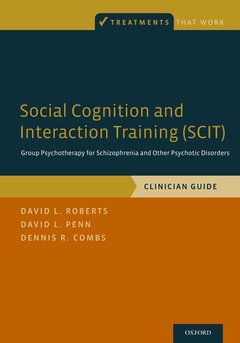Social Cognition and Interaction Training (SCIT) Group Psychotherapy for Schizophrenia and Other Psychotic Disorders, Clinician Guide Treatments That Work Series
Langue : Anglais
Auteurs : Roberts David L., Penn David L., Combs Dennis R.

Impairments in social functioning are among the hallmark characteristics of schizophrenia. These deficits predict relapse rate and may be independent of better-studied symptoms such as hallucinations. Additionally, studies indicate that social functioning is one of the most important domains for individuals with schizophrenia, many of whom consider social functioning to be a key area of unmet need. Social Cognition and Interaction Training (SCIT) is a group psychotherapy for individuals with schizophrenia and other psychotic disorders. Social cognition refers to the thinking processes that people use to navigate the social world. Deficits in social cognition hinder people with schizophrenia and other mental illnesses from living meaningful, socially connected lives. The SCIT Clinician Guide provides comprehensive instruction for mental health professionals to enhance social cognition and promote rewarding social lives for their clients. SCIT is appropriate for adults suffering from psychotic illness and who have interpersonal difficulties as a result. SCIT is particularly appropriate for individuals with symptoms of suspiciousness and paranoia. The authors summarize the rationale and theoretical underpinnings of SCIT, distinguish it from other treatments for psychosis, provide an overview of the intervention, explain the links between the intervention activities and the underlying theoretical model, and describe SCIT implementation session-by-session. SCIT is a 20- to 24-week group-based treatment that can be delivered by mental health clinicians of all levels in a wide range of community and hospital settings. SCIT uses exercises, games, discussion formats, and interactive social stimuli to target and improve specific areas of social cognitive dysfunction, and includes user-friendly tips and handouts for clients. It also provides web access to a library of videos, images and slide shows that are used to bring the SCIT training sessions to life.
David L. Roberts, PhD, is an Assistant Professor in the Department of Psychiatry at the University of Texas Health Science Center in San Antonio. He specializes in the treatment of social dysfunction among people with schizophrenia and other psychiatric disorders. David L. Penn, PhD, is the Linda Wagner-Martin Distinguished Professor of Psychology at the University of North Carolina-Chapel Hill. His research is focused on social cognition and psychosocial treatment for schizophrenia. Dennis R. Combs, PhD, is an Associate Professor of psychology at the University of Texas at Tyler. He is also a licensed clinical psychologist in Texas. His research has primarily focused on understanding, characterizing, and remediating the various social cognitive deficits found in schizophrenia and paranoia.
Date de parution : 01-2016
Ouvrage de 256 p.
25.1x18 cm
Thèmes de Social Cognition and Interaction Training (SCIT) :
© 2024 LAVOISIER S.A.S.



